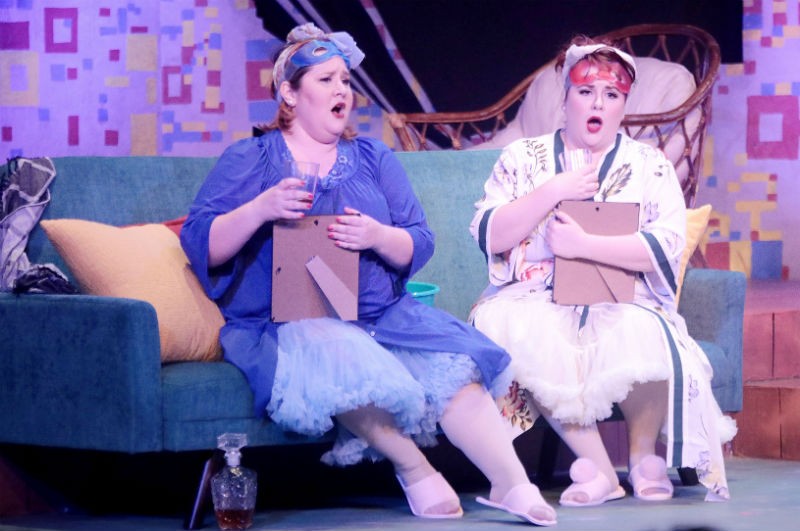Viennese court composer Antonio Salieri was never Wolfgang Amadeus Mozart's scheming nemesis (sorry, Peter Shaffer with your delightfully wicked Amadeus) so much as he was Mozart's unwitting irritant. He certainly never tried very hard to help out the genius, but he actually did do one thing which was sublimely right – he sent Lorenzo Da Ponte's libretto of Così fan tutte to him. Salieri couldn't get the hang of this wily sex comedy and abandoned the project after some brief sketches. He was much too Baroque, anyway, with all his ponderous mythological opera serias, to do justice to Così's frothy Enlightenment. Mozart was ripe for it.
Opera in the Heights' production is replete with froth, bounce, charm. With the best ensemble cast in seasons, the young performers, all age appropriate for their roles as faithless females, macho guys, and wise servants, bring fresh life into this somewhat buffo work with its darker Shakespearean undertones. They all romp when they should romp, and display pangs of guilt when their hearts go so easily astray. It's an ensemble opera of the highest quality, and OH, under the melting rightness of maestro Eiki Isomura, brings it off like a laughing sigh.
Best bros, Ferrando (tenor Andrew Surrena) and Guglielmo (baritone Adam Richardson), love two sisters, Dorabella (mezzo Anne Maguire) and Fiordiligi (soprano Katy Lindhart). They rave about their faithfulness and constancy to experienced roue Don Alfonso (bass Benjamin Sieverding), who's been around the Prater a few times. He bets the guys that their gals will be unfaithful within moments if given the opportunity. “All women are like that,” he crows (“Così fan tutte”), it's their nature, get used to it. Incensed that their manly pride could be so easily punctured, the guys take the bet and woo the other's girl in disguise. Surprise, surprise, the women, though momentarily racked by indecision, fall right into their arms. Saucy maid Despina (soprano Ariana Wehr), who knows all about men, abets the plot with her no-nonsense advice and puts on a disguise or two to speed things along.
All this silly subterfuge and wooing take place within hours, adding to the lightheartedness and buffoonery of Da Ponta's screwy plot. Mozart, though, sublimely offers us something deeper to think about as his quartet of mismatched lovers agonize over what they're doing. How quickly they fall. As Fiordiligi pines so exquisitely in her showstopper “Come scoglio” (“Like the rock”), only death should alter her constancy. But it's futile; after all, everyone's only human. Mozart gives her a seria aria to rival the best, full of sturm und drang and the type of introspection only Mozart could so securely capture. Lindhart, roaming the platform stage, tears into this concert piece with tempered steel and filigreed resolve. Needless to say, she succumbs soon after her impassioned outburst.
Everyone has something to say in this ensemble piece, and all voices are important. Lindhart supplies creamy tone and oomph; Maguire has velvet; Surrena is bright trumpet; Richardson has attack and dusky sheen; Sieverding brings an urbane suavity; and Wehr is gleaming crystal. Their voices blend as neatly as does the orchestra's.
The whole thing is finely tuned. Director David Ward's updating into the swinging '60s is apt, and Jonathan Dahm Robertson's tiered set with pop art touches could double as Bobby's pad in Sondheim's Company, and Macy Lyne's polka dot flared dresses and saddle shoes summon Edward Stevenson's high style from I Love Lucy. Although the disguises of the guys are practically nonexistent – some hair gel and glasses, instead of the original's “Albanian” mufti with turbans and large mustaches – we go along with the joke, merrily suspending our disbelief, because Mozart never lets us down. He supplies all the crackle and pop needed.
The score is endlessly varied, sumptuously and inventively orchestrated, and studded with melodies great and small. The opera's so effervescent, it practically bubbles, with an overture that chases itself around much like the characters will later do. Although it had a decent run of ten performances at its 1790 Vienna premiere, Così didn't catch fire until the 20th century. Whether it was the staid Victorians who didn't approve of the swapping partners plot, it's difficult to say, but of all Mozart's masterpieces, Così was the least performed. No longer, thanks to the opera gods.
OH's production is nigh on definitive, all of one piece, all beautifully performed, all one tone. It's like a lover's lilting serenade below a balcony. Play on, OH troubadours.
Performances of Così fan tutte are scheduled for 2 p.m. November 11 and 7:30 p.m. November 15 and 17 at Opera in the Heights, 1703 Heights Boulevard. For information call 713-861-5303 or visit operaintheheights.org/cosi. $40.50 to $94.50.
Support Us
Houston's independent source of
local news and culture
account
- Welcome,
Insider - Login
- My Account
- My Newsletters
- Contribute
- Contact Us
Opera in the Heights' Production of Cosi fan tutte is Filled With Bounce, Charm and Great Music

Photo by Pin Lim
(L-R) Katy Lindhart as Fiordiligi and Anne Maguire as Dorabella
[
{
"name": "Related Stories / Support Us Combo",
"component": "11591218",
"insertPoint": "4",
"requiredCountToDisplay": "4"
},{
"name": "Air - Billboard - Inline Content",
"component": "11591214",
"insertPoint": "2/3",
"requiredCountToDisplay": "7"
},{
"name": "R1 - Beta - Mobile Only",
"component": "12287027",
"insertPoint": "8",
"requiredCountToDisplay": "8"
},{
"name": "Air - MediumRectangle - Inline Content - Mobile Display Size 2",
"component": "11591215",
"insertPoint": "12",
"requiredCountToDisplay": "12"
},{
"name": "Air - MediumRectangle - Inline Content - Mobile Display Size 2",
"component": "11591215",
"insertPoint": "4th",
"startingPoint": "16",
"requiredCountToDisplay": "12"
}
,{
"name": "RevContent - In Article",
"component": "12527128",
"insertPoint": "3/5",
"requiredCountToDisplay": "5"
}
]

